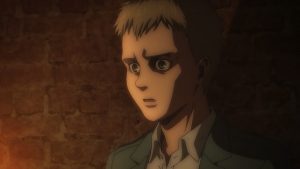 Clearly this was a moment that fans of the Attack on Titan manga have been looking towards with considerable anticipation. And it’s easy to see why – that scene in the basement was suitably tense. I think it was especially effective having Falco present for this, as his innocent horror at what was happening – and at how he’d been used – cast the whole sequence in a somewhat dismal light. It’s just too bad things had to get muddled up with real-world allegory, as they usually seem to with this series.
Clearly this was a moment that fans of the Attack on Titan manga have been looking towards with considerable anticipation. And it’s easy to see why – that scene in the basement was suitably tense. I think it was especially effective having Falco present for this, as his innocent horror at what was happening – and at how he’d been used – cast the whole sequence in a somewhat dismal light. It’s just too bad things had to get muddled up with real-world allegory, as they usually seem to with this series.
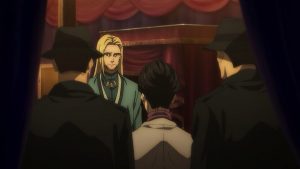 The thing is, if Iseyama had wanted to have a “pox on all your houses” sort of story, where everyone’s forefathers were complicit in the sorry state of the world, he could easily have done so without tripping himself up. All had to do was leave the Holocaust symbolism out of it, because painting the history of the Holocaust and pre-Holocaust in this “everyone shares the blame” light is a kind of “good people on both sides” moment. This whole thing is an unforced error, because it seemingly wasn’t necessary to tell the story Iseyama is telling. I won’t presume to know why he went this route – wether it’s an expression of belief or simply ignorance about how it would be perceived. But in the final analysis that doesn’t really matter, because it is what is and he wrote what he wrote.
The thing is, if Iseyama had wanted to have a “pox on all your houses” sort of story, where everyone’s forefathers were complicit in the sorry state of the world, he could easily have done so without tripping himself up. All had to do was leave the Holocaust symbolism out of it, because painting the history of the Holocaust and pre-Holocaust in this “everyone shares the blame” light is a kind of “good people on both sides” moment. This whole thing is an unforced error, because it seemingly wasn’t necessary to tell the story Iseyama is telling. I won’t presume to know why he went this route – wether it’s an expression of belief or simply ignorance about how it would be perceived. But in the final analysis that doesn’t really matter, because it is what is and he wrote what he wrote.
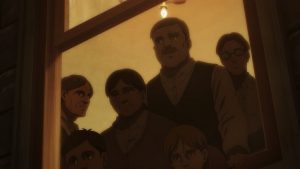 Be that as it may, after a somewhat lumbering buildup the shit is finally hitting the fan, and we’ve clearly entered a new phase of the story. There’s still no sign of Mikasa or Armin (I thought that was him leading the titan holders into the trap for a second, but it wasn’t) but Eren meeting Reiner has shifted the plot out of neutral. As Willy Tyburn blows the lid of his own family’s cover story in a somewhat bizarre and surrealistic pantomime, Eren and Reiner have a very strained and strange reunion as a bewildered Falco looks on.
Be that as it may, after a somewhat lumbering buildup the shit is finally hitting the fan, and we’ve clearly entered a new phase of the story. There’s still no sign of Mikasa or Armin (I thought that was him leading the titan holders into the trap for a second, but it wasn’t) but Eren meeting Reiner has shifted the plot out of neutral. As Willy Tyburn blows the lid of his own family’s cover story in a somewhat bizarre and surrealistic pantomime, Eren and Reiner have a very strained and strange reunion as a bewildered Falco looks on.
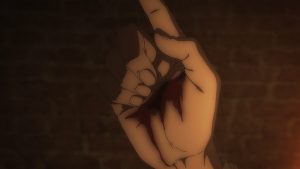 One might reasonably ask why Eren felt the need to meet Reiner in the first place, because to me at least it’s not immediately apparent. Certainly there appears to be no strategic necessity – I think he wanted to hear Reiner’s version of the events that changed his life forever. Eren is an interesting case study at this point in the story, to be sure. He’s used the blameless Falco for his own ends, likely ruining his life by doing so. He’s gone full titan in front of a crowd of civilians, likely killing many of them in the process. Is he doing it all to save his people, or destroy the world? Or something else altogether?
One might reasonably ask why Eren felt the need to meet Reiner in the first place, because to me at least it’s not immediately apparent. Certainly there appears to be no strategic necessity – I think he wanted to hear Reiner’s version of the events that changed his life forever. Eren is an interesting case study at this point in the story, to be sure. He’s used the blameless Falco for his own ends, likely ruining his life by doing so. He’s gone full titan in front of a crowd of civilians, likely killing many of them in the process. Is he doing it all to save his people, or destroy the world? Or something else altogether?
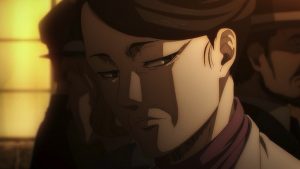 I do know it makes me sad to see Reiner devolve into a simpering mass of self-pity, because he’s always been one of the most genuinely interesting characters in the cast. He was ready to kill himself once; he asks Eren to finish him off here. I don’t doubt that he’s sincerely had it with life and his place in it at this point, but he’s introspective in a way few in this series are (as is Armin). He’s one of the few characters I could legitimately see ending up deciding to fight for something better for the world simply because it was the right thing to do, but clearly he has a long way to climb back before he’s able to do anything of that nature.
I do know it makes me sad to see Reiner devolve into a simpering mass of self-pity, because he’s always been one of the most genuinely interesting characters in the cast. He was ready to kill himself once; he asks Eren to finish him off here. I don’t doubt that he’s sincerely had it with life and his place in it at this point, but he’s introspective in a way few in this series are (as is Armin). He’s one of the few characters I could legitimately see ending up deciding to fight for something better for the world simply because it was the right thing to do, but clearly he has a long way to climb back before he’s able to do anything of that nature.


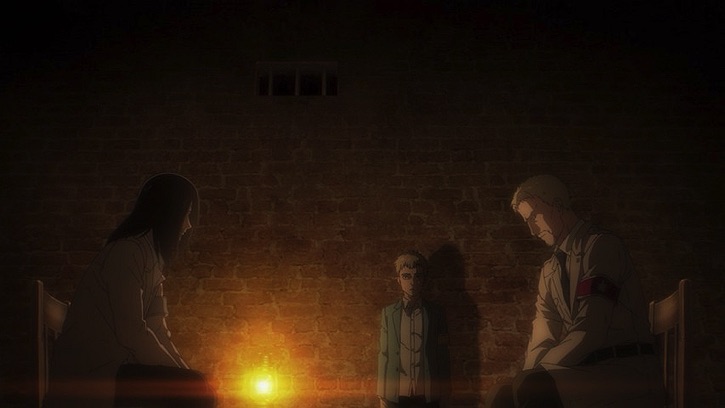
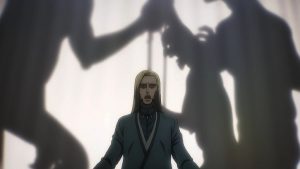
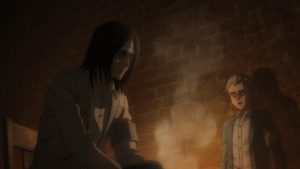
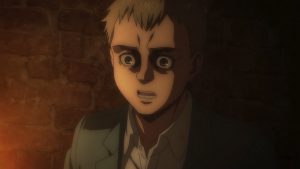
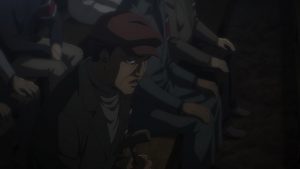
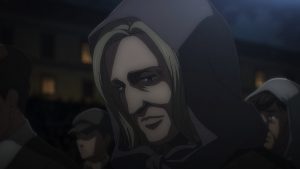
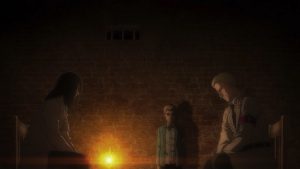
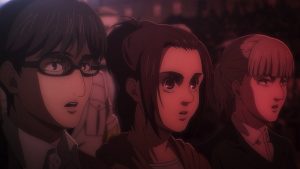
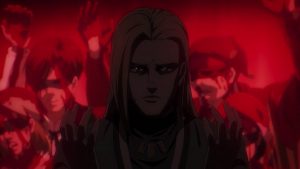
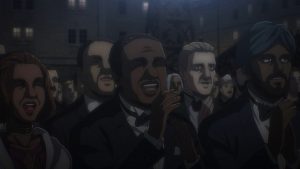
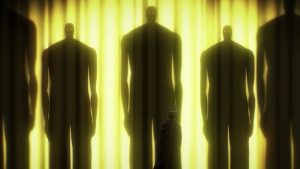
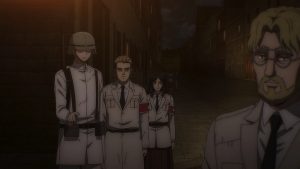
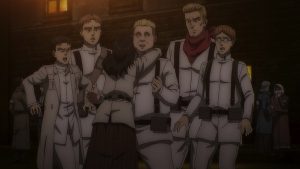
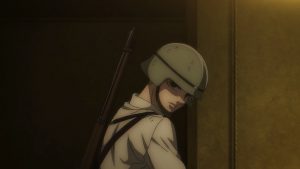
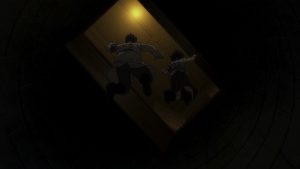
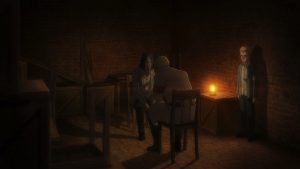
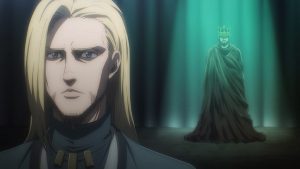
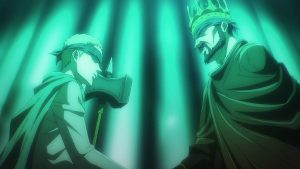
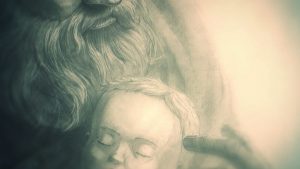
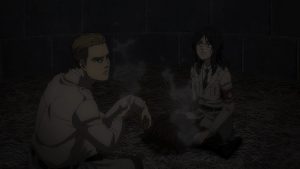
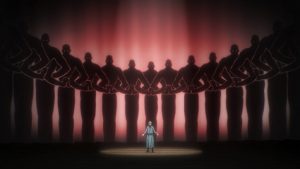
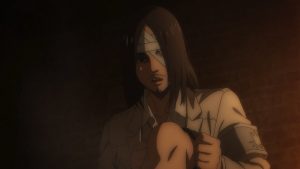
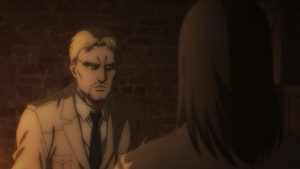
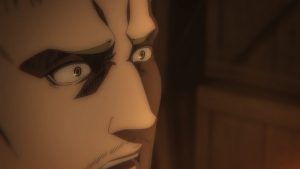
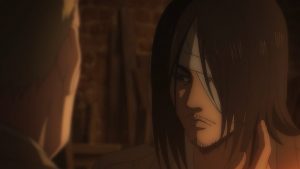
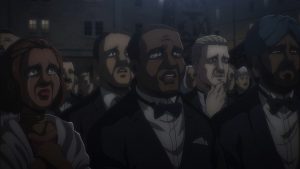
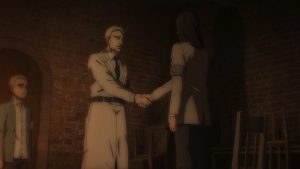
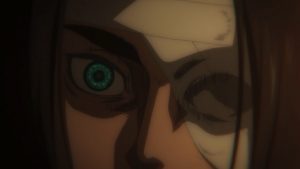
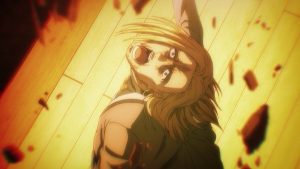
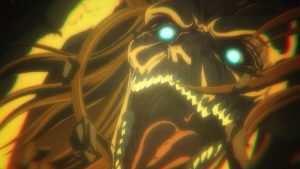
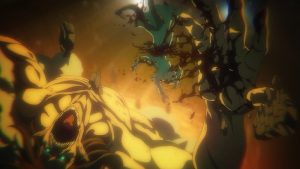
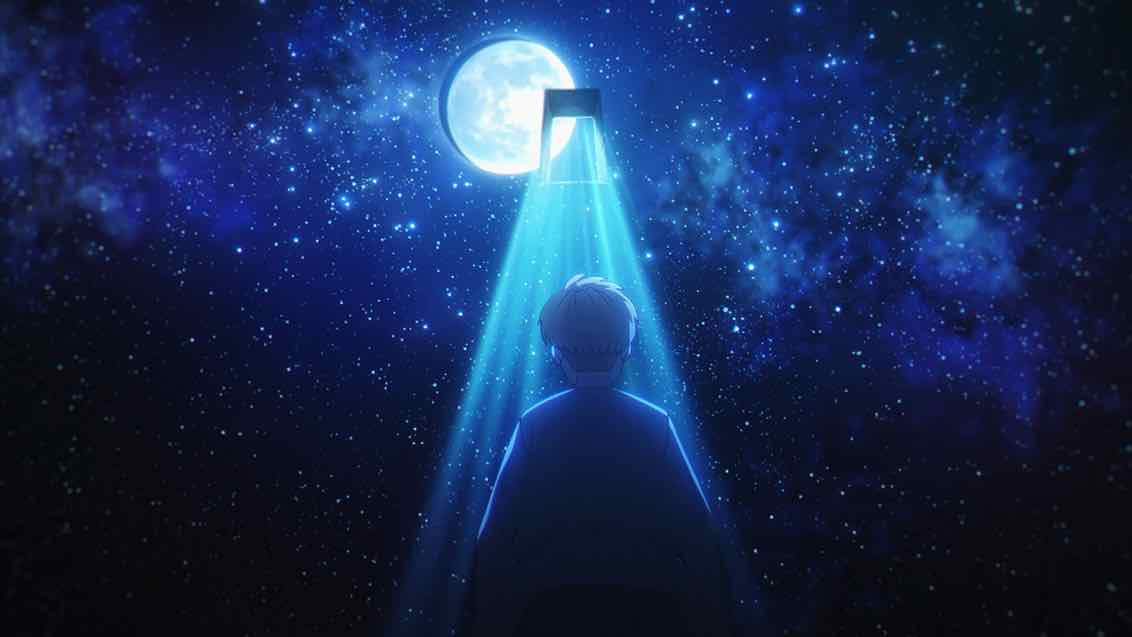
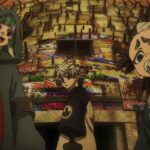
Miyu Fan
January 11, 2021 at 10:59 pmI agree that really if AoT had removed that Holoucast band and all that symbolism everything would be more bearable in the series. It’s just so hard for me to view Reiner as anything evil when he felt all guilty while wearing that Holocaust symbol.
And of course hopefully the story will frame Eren being in the wrong path as he basically doing an equivalent of dropping a bomb in a civilian zone without any prior warning. But then maybe every character in this series will commit evil acts in the end so that you don’t even know who supposed to be on the right side hah.
ibtachi
January 12, 2021 at 1:31 amIt was genuinely engaging in a way that isn’t exactly typical of SnK. In particular Eren’s comments on Reiner’s indoctrination, his reaction to “Because I was born in the world” and his muddied view of the concept of good or bad…definitely gave this episode a Nietzsche-esque flavour. I was also glad that none of these sentiments were presented as noble (like Erwin’s consequentialism). At the very least it seems like this new Eren is far more misanthropic and nihilistic. It’ll be interesting if Reiner ends being positioned as his narrative/philosophical foil.
A shame, again, that what was possibly the most genuinely interesting discussion in the series was undermined by you-know-what. It’s becoming clearer and clearer how utterly unnecessary the imagery is to the story he’s telling.
Orion Taylor
January 12, 2021 at 1:37 amI’m pretty sure that Karl Fritz’s war renunciation vow is supposed to be Attack on Titan’s version of Article 9 of the Japanese Constitution. Given how that worked out for the Paradisians (it royally f***ed them over), I would guess that Isayama is probably not a big fan of Article 9. IMO, this is actually one of the most significant pieces of evidence to look at when trying to figure out Isayama’s intended message for the series, especially if your thesis is that AoT is some kind of fascist/Japanese nationalist allegory.
Guardian Enzo
January 12, 2021 at 7:37 amHappily for Isayama, Japanese nationalist and Holocaust-denial messaging is complementary.
Krize
January 13, 2021 at 10:32 amI’m just not behind this strain of reasoning. Sooner rather than later, everyone who lived, suffered, and died in WW2 as an aggressor or a victim will be dead. In a little over twenty years we’ll be passing a 100 years since the conflict. I think it’s natural for people to begin something like article 9, which is more akin to US second amendment (IE, something that existed as a product of the particular time and events at it’s creation could arguably outdated, rather than a sacred principal of the nation).
But anyways, I don’t even agree that’s what Isayama’s angle is, and continue to feel that people who think they know his intentions are mistaken. That Isayama himself has made mistakes in the framing his narrative are unmistakable-while I’m inclined to believe that malice wasn’t the idea hear, the imagery invites distasteful comparisons if people are so inclined. I don’t think story minces any words that even if blood libel were true, people still wouldn’t deserve to be treated the way the Eldians are.
I don’t know. This is still a deeply interesting show to me, and the conversation Eren and Rein had, the awareness Eren possessed of their situations, simply couldn’t be written by a man incapable of introspection. I would argue the degree to which AoT refuses to look away or hide the brutality that awaits those who choose violence, and it’s awareness of the neverending cycle of escalations and reprisal that follow in it’s wake is demonstrative of a deeply anti-violent work. What else are we to make of Eren in this situation, who seems to recognize the irony of his reversed position to Reiner and feels also that he’s locked into no other course because he chose violence so long ago. As Theon Greyjoy one said, he’s gone too far to pretend to be anything else.
Guardian Enzo
January 13, 2021 at 1:31 pm“Even if blood libel were true” pretty much says it all right there. You cannot draw that analogy and expect people who stayed awake in history class not to be horrified. That is not, in any way shape or form, a compelling defense of Isayama in my opinion.
As you said, we don’t know his intentions (though he’s given us hints, in my opinion – honest people can disagree). All I can go by is what he puts on the page (and he’s basically been writing the manga as a storyboard for the anime for years now). And draw the conclusions it leads me to.
None of this is a comment on whether or not Shingeki is an interesting series. It is, IMO, even though I still think Isayama is mostly terrible with character.